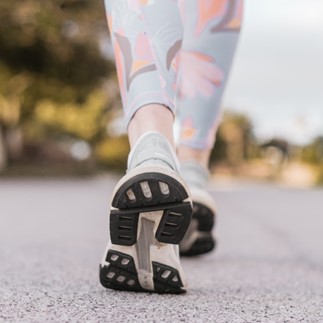Walking is one of the simplest and most effective forms of exercise. While walking on a treadmill or around an indoor track has its benefits, there is something uniquely invigorating about walking outdoors. Manal Jishi explores below the numerous benefits of outdoor walking, including physical, mental, and emotional well-being, and why you should consider making it a regular part of your routine.
Physical Health Benefits
Cardiovascular Health: Walking outdoors can significantly improve your cardiovascular health. It helps in lowering blood pressure, reducing bad cholesterol (LDL), and increasing good cholesterol (HDL). Regular walking can reduce the risk of heart disease and stroke.
Weight Management: Walking is an excellent way to burn calories. The varying terrain of outdoor environments can make walking more challenging than on a flat surface, leading to more calories burned. Incorporating hills, stairs, or uneven ground can increase the intensity of your workout.
Strengthens Muscles and Bones: Walking strengthens the muscles in your legs, hips, and core. It also helps in maintaining bone density, which can reduce the risk of osteoporosis. Walking on different surfaces, such as grass, sand, or gravel, engages different muscle groups and improves balance and stability.
Improves Immune Function: Regular moderate exercise can boost your immune system. It enhances the circulation of immune cells in your body, helping you stay healthy and ward off illnesses.
Mental Health Benefits
Reduces Stress and Anxiety: Being outdoors in nature has been shown to reduce stress and anxiety levels. The combination of physical activity, fresh air, and natural surroundings helps in lowering cortisol levels, the body’s primary stress hormone.
Enhances Mood: Exposure to natural light and the rhythmic nature of walking can improve your mood. Walking outdoors increases the production of endorphins and serotonin, neurotransmitters associated with feelings of happiness and well-being.
Boosts Creativity: Walking outdoors has been linked to enhanced creativity and problem-solving skills. The change of scenery and the gentle stimulation of the senses can help in generating new ideas and perspectives.
Improves Sleep: Regular outdoor walking can improve the quality of your sleep. Exposure to natural light helps regulate your circadian rhythm, which controls your sleep-wake cycle. This can lead to better sleep patterns and increased overall sleep quality.
Emotional and Social Benefits
Walking outdoors allows you to connect with nature, which can have a calming and grounding effect. This connection can improve your overall sense of well-being and satisfaction with life. Moreover, being outside offers a sense of freedom and adventure. The open environment, changing scenery, and fresh air contribute to a feeling of liberation from the confines of indoor spaces.
Talking a stroll with friends, family, or a group provides an excellent opportunity for social interaction. It can strengthen relationships, provide emotional support, and increase motivation to stick with a regular walking routine.
Achieving your fitness goals, whether it’s distance, speed, or consistency, can boost your self-esteem and confidence. The sense of accomplishment from regular outdoor walking can positively impact other areas of your life.

Tips for Getting Started with Outdoor Walking
Start Slow: If you’re new to walking or haven’t been active for a while, start slow and gradually increase your distance and pace. Listen to your body and avoid overexertion.
Choose the Right Footwear: Invest in a good pair of walking shoes that provide adequate support and cushioning. This can prevent injuries and make your walks more comfortable.
Plan Your Route: Choose a safe and scenic route for your walks. Parks, trails, and quiet neighborhood streets are excellent options. Varying your routes can keep your walks interesting and enjoyable.
Stay Hydrated: Carry a water bottle with you, especially on longer walks. Staying hydrated is crucial for maintaining energy levels and overall health.
Dress Appropriately: Wear weather-appropriate clothing. In colder weather, dress in layers to stay warm. In warmer weather, wear light, breathable fabrics and use sunscreen to protect your skin from UV rays.
Use Technology: Use a fitness tracker or smartphone app to track your steps, distance, and progress. Setting goals and monitoring your achievements can be motivating and rewarding.
Conclusion
Walking outdoors offers a multitude of benefits for your physical, mental, and emotional well-being. From improving cardiovascular health and boosting mood to enhancing creativity and providing social interaction, the advantages of outdoor walking are vast. By incorporating regular outdoor walks into your routine, you can enjoy these benefits and make a positive impact on your overall quality of life. So next time, take a step outside and embrace the joys of walking in the great outdoors.
